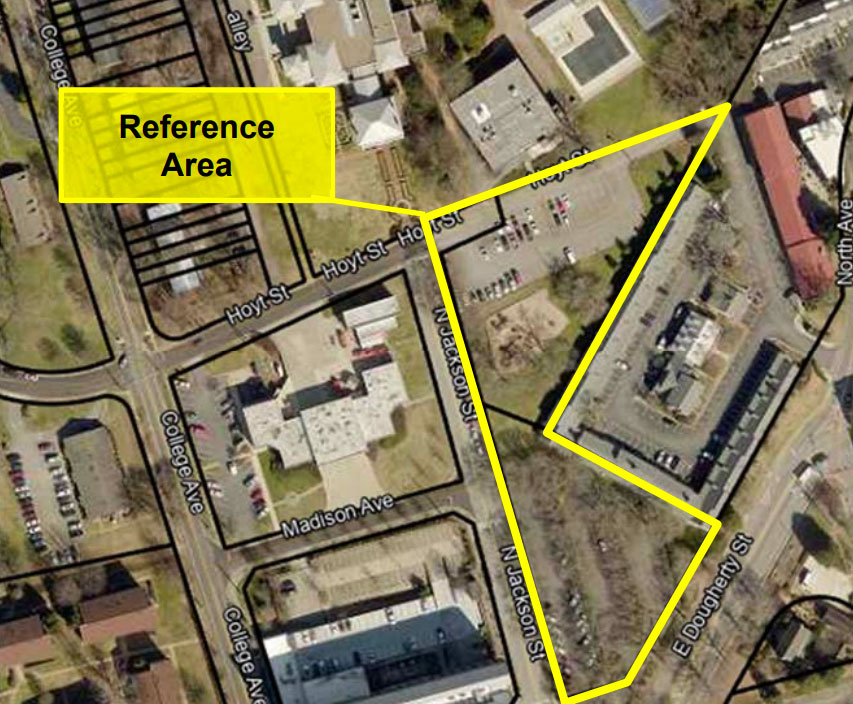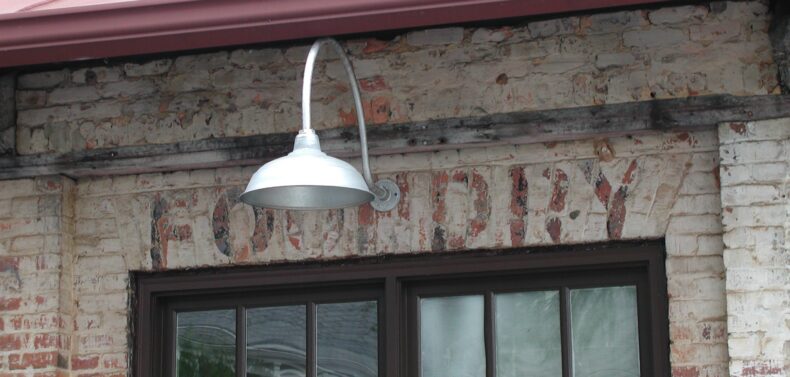A downtown parking lot that’s been targeted for redevelopment for more than a decade, along with a nearby hotel, are slated to become student housing under a deal with the Athens-Clarke County government that would net the county a new parking deck and sewer line, in addition to millions of dollars for affordable housing.
Under a proposed intergovernmental agreement, or IGA, developer Core Spaces, which recently purchased the Hotel Abacus (formerly known as Graduate Athens and the Foundry Inn) would receive two adjacent Athens Downtown Development Authority-owned parking lots off Jackson Street. In exchange, Core Spaces would build a 350-space public parking deck, pay $2.5 million to expedite a sewer project and contribute $7.9 million to ACC’s affordable housing trust fund.
“There’s a lot of public benefit involved in this, and it’s a very transformational project that we’re excited to be a part of,” Andy Savoy, vice president of development for Chicago-based Core Spaces, told commissioners at their May 20 agenda-setting meeting. The same company is also building a student housing project at 155 E. Mitchell St. known as Hub Athens.

Surface parking lots like those north of Dougherty Street have been targeted for infill development since at least 2012, when now-retired UGA urban planning professor Jack Crowley created the downtown master plan. A previous IGA between the ACC government and the ADDA in 2020 called for 120 senior housing units and a 500-space parking deck. That deal fell through because “it was somewhat unfeasible to develop those two unusually shaped triangles,” according to Mayor Kelly Girtz.
In March, Core Spaces acquired Hotel Abacus and approached ADDA and ACC officials about the Jackson Street parking lots. “Essentially, a property swap became an option, where we would be able to get the benefit of a new parking facility, where I certainly hope we will be able to consolidate parking along Dougherty Street,” Girtz said.
The development would include about 800 bedrooms, taking advantage of ACC’s inclusionary zoning ordinance offering additional density in exchange for affordable housing. For downtown projects, developers can contribute cash to build affordable housing elsewhere instead of building it onsite.
According to the IGA, Core Spaces would agree to put a protective easement on the historic foundry building at Hotel Abacus, and pay to relocate the historic Hoyt House and the playground at Lay Park. The company would also spend $2.5 million on an expanded sewer main along College Avenue that otherwise would be years away from construction, while ACC agrees to reduce connection fees by 30%, or $700,000.
The project would generate $3.8 million in taxes annually, according to Savoy, with $1.5 million of that going into a tax allocation district (TAD) for infrastructure improvements. Seventy percent of those TAD funds are designated for the Inner East Athens neighborhood.
Commissioner Melissa Link, who represents downtown, said she supports the agreement because of the TAD funding for East Athens, the sewer line and the funding for affordable housing. The latter two could be crucial to completing The View at NoDA, a mixed-income community at the site of Bethel Midtown Village, she said. A 2018 Public Utilities study found that the north downtown area lacked the sewer capacity to support further growth.
“I’m not a big fan of student housing, but the reality is, we live in a university community, and UGA is increasing their enrollment every year, and I would rather see students in this location than… in our neighborhoods,” Link said. “I’m really hoping we can pull some of these kids out of our residential neighborhoods and into a community just like this, where they belong, where they’re right downtown and not adjacent to our neighborhoods, and we can start opening up some of those single-family homes back to families.”
Commissioner Carol Myers was less enthusiastic, asking county staff for more details before a June 3 vote. “Yeah, maybe it is the best place, but as someone who’s been here for 40-plus years, I do feel like we’ve been turning over downtown to students,” she said. “At least we get tax revenue.”
Savoy addressed the lack of detail by saying that the documents commissioners are being asked to approve are only preliminary. “These agreements are just agreements to negotiate further agreements that would have to come back for final approval,” he said.
Commissioners had little to say about waiver requests for another huge development, this one including 925 attached, detached and multifamily units off Atlanta Highway—amendments to an originally New Urban plan first approved in 2004. The planning commission, an advisory board, unanimously recommended denial, criticizing D.R. Horton’s revised plan as bland and cookie-cutter compared to the original. Commissioner Stephanie Johnson said there will be a drop-in meeting about the development on Thursday, May 29 from 5:30–7:30 p.m. at the ACC Extension Office.
Another sizable development—300 attached and detached single-family homes off Newton Bridge Road—appears poised to pass June 3. The area is currently zoned industrial, but county officials believe it will never be developed for an industrial use, and that residential is more appropriate, pointing to nearby developments like General Time. The planning commission unanimously recommended approval after applicant Jerry Wood of DuSouth LLC agreed to stipulations like building a multiuse path connecting the subdivision to the North Oconee River Greenway and a roundabout at the Newton Bridge-Vincent Drive intersection.
Commissioners dodged discussion on a $25 million federal grant for North Avenue, opting to wait until June 3 to tip their hands. Staff has recommended trying to convince the Federal Highway Administration to turn the grant into a vastly reduced planning grant because ACC is unlikely to meet a September 2026 deadline to start construction.
Nonprofits Seek Funding
Prior to the agenda-setting meeting, more than a dozen residents spoke at a public hearing on Girtz’s proposed $201 million budget for fiscal 2026, urging the commission to keep a community energy fund and the neighborhood leaders program.
The community energy fund, created in 2021, sets aside the franchise fees paid by electric and gas companies to use the public right-of-way, about $7 million a year. That money is earmarked to help low-income residents, seniors and small businesses make energy-efficient improvements to their property, such as installing insulation.
The neighborhood leaders program, a partnership with Community Connection-Families in Schools, employs 10 people, one in each commission district, to help residents access social services like food assistance.
Girtz told Flagpole that, despite at least one commissioner suggesting returning franchise fees to the general fund, the community energy fund does not appear to be in danger. No one has suggested cutting neighborhood leaders this year, although the commission has discussed it in the past.
Erin Barger, president and CEO of the Food Bank of Northeast Georgia, asked the commission for funding as well, pointing to rising food costs combined with rising food insecurity in Athens. “The meal gap here is larger than we can close alone,” she said. “We need your help.”
The commission is scheduled to approve the final budget at a called meeting June 10.
Like what you just read? Support Flagpole by making a donation today. Every dollar you give helps fund our ongoing mission to provide Athens with quality, independent journalism.










